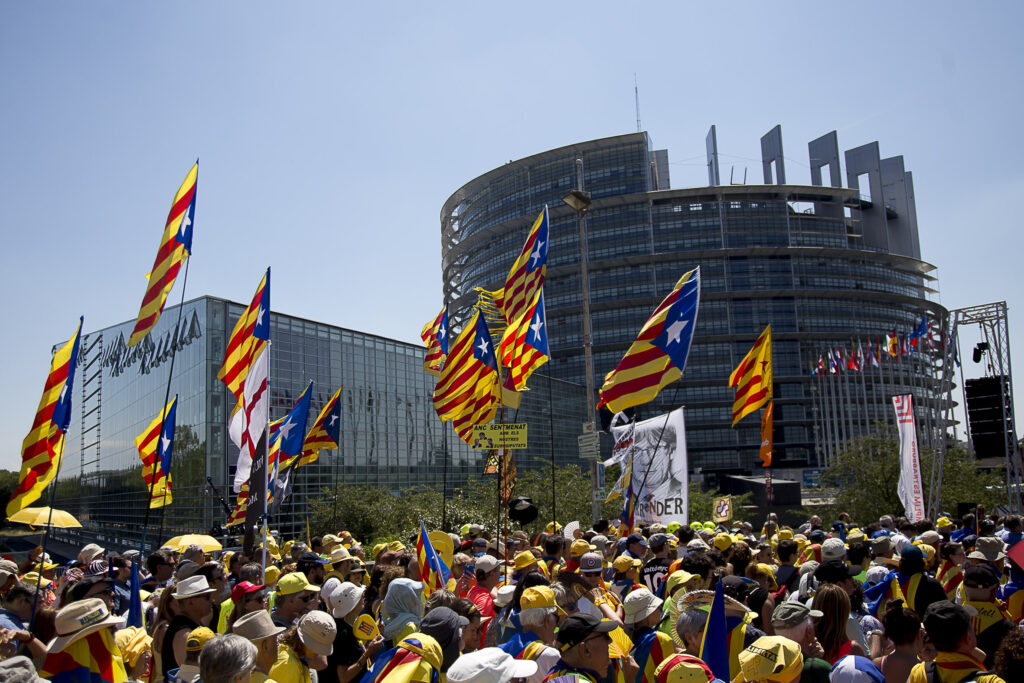18.06.2020 - 08:44
|
Actualització: 18.06.2020 - 10:44
As the lawyer of Catalan president Carles Puigdemont and minister Toni Comín, July 2, 2019 was one of the hardest days ever for Gonzalo Boye. It will soon be exactly one year since the time when the exiled Catalan leaders couldn’t make it to Strasbourg on the day when the newly-elected European Parliament was being inaugurated. The Spanish authorities, in cahoots with the European chamber’s outgoing officials, had managed to strip them of their MEP status and, even though it had agreed to examine the complaint filed by Puigdemont and Comín, Europe’s justice refused to issue a last-minute injunction that would have allowed them to take up their seats in Parliament.
Having travelled from Waterloo (Belgium), that day the two Catalan MEP-elects were about to cross the border that separates Germany and France, if anything at least to greet the Catalans that had gathered outside the European Parliament, mobilising by the thousand in their support. Eventually they refrained from doing so because Boye told them there was no way they could possibly take that chance. They had received information that left them in no doubt about the Spanish government’s intention to arrest them and rush them straight to Madrid, aided by the French authorities. Gonzalo Boye’s new book, Así están las cosas [The Current State of Affairs], which is coming out next Thursday [published by Roca Editorial in Spanish], tells the full story and VilaWeb is offering our readers the following taster.
The day before the European Parliament was due to convene, Puigdemont and Comín’s defence team learnt about the 2002 Málaga Accord between France and Spain, which aimed to expedite the extradition of Spanish or French passport-holders who were suspected of being members of ETA, the Basque separatist group. That was the agreement’s intended purpose at the time and, even though it was never invoked, it remained in force. That was precisely the trump card that the Spanish authorities sought to use in order to seize Puigdemont and Comín and hand them over to Spain’s justice, even if the accord’s legal standing was doubtful, to say the least, as far as European law was concerned.
Stuck in Kehl
In his book Boye writes that, nevertheless, they travelled on as planned, at least as far as Kehl, the last German city before crossing the French border, a stone throws away from Strasbourg. During the journey they heard that the General Court of the UE had refused them the injunction that would have allowed the two Catalan MEP-elects to enter the European Parliament. This only added to their concern about a possible arrest, if they crossed the border into France.
This is Boye’s own account of what happened when they checked into their hotel in Kehl: “A few minutes after getting to the hotel, we received fresh information about the operation they had set up in order to arrest my clients. Something that caught my attention was that we were warned that [in the event of an arrest] there would be no time to file an appeal with a court of law because they’d be in Spain within forty minutes. Obviously they intended to send them back on a plane”.
“I rang a friend who was on the French side of the border and I was able to ask her to drive to Strasbourg airport, which is rather small, and check whether there were any private jets or even an official plane from Spain. Nearly an hour later she sent us photographs of three planes and, as soon as we checked their registration numbers, it became apparent what their plan was”. Gonzalo Boye then writes that “the French were adamant that crossing the border was not a good idea because they could offer no guarantees and, if we did so and got arrested, we’d have no chance of preventing the French authorities from handing my clients over to their Spanish partners”.
Suspicious-looking men
Boye recalls how early the next day, July 2nd, he saw several suspicious-looking men in the hotel as information kept coming in about a large contingent of Spanish operatives on French soil and the discussion he had with Puigdemont and Comín about the possibility of crossing the border. The Catalan president and his minister were keen to do so, but ultimately Boye argued his point vehemently and his advice prevailed. The two MEP-elects recorded a video message for the thousands of demonstrators who rallied outside the European Parliament, which was delivered personally by Míriam Santamaría, Puigdemont’s communications director, and lawyer Josep Costa, the Deputy Speaker of the Catalan Parliament. “On our way there we noticed many unmarked vehicles parked no more than thirty feet from each other. As we inched closer to our destination we became increasingly persuaded that we had made the right decision”.
There was yet another incident, which Boye recounts in his new book, that came as an additional eye-opener. Puigdemont and Comín travelled to the tallest building in Kehl, a vantage point from which they could see the rally in Strasbourg. This was the spot where they recorded their video message to the demonstrators. “As we got there […] a car carrying four passengers suddenly braked to a halt in front of Toni and the president. Two of the occupants got out, clearly intending to seize them. We reacted fast and got both my clients into the building’s hall and thus averted the reckless action by the operatives, who were on German soil by then […]. We managed to photograph the vehicle as its occupants gave up their pursuit and sped off”.


